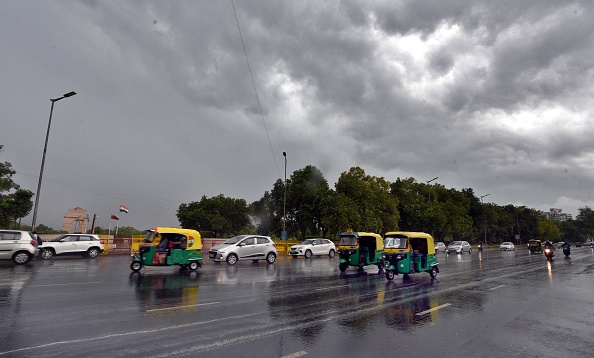
Photo: Getty
Air quality in Delhi and its adjacent regions saw a slight improvement owing to recent rainfall and favourable wind conditions attributed to a western disturbance affecting northwest India.
The Safdarjung Observatory, Delhi’s primary weather station, reported 7.2 mm of rainfall until 8:30 pm on Monday.
An official from the India Meteorological Department highlighted that the wind speed had picked up to 20 kilometres per hour, facilitating the dispersion of pollutants.
As of Tuesday at 8 am, Delhi’s air quality index (AQI) stood at 365, a marked improvement from the 395 recorded at 4 pm on Monday. The AQI represents a 24-hour average of readings.
The recent 24-hour average AQI stood at 395 on Sunday, 389 on Saturday, 415 on Friday, 390 on Thursday, 394 on Wednesday, 365 on Tuesday, 348 on Monday, and 301 on November 19.
The categorization of AQI levels ranges from ‘good’ between zero and 50, ‘satisfactory’ from 51 to 100, ‘moderate’ from 101 to 200, ‘poor’ from 201 to 300, ‘very poor’ from 301 to 400, ‘severe’ from 401 to 450, and ‘severe-plus’ above 450.
Earlier on Monday, thick smog enveloped Delhi, reducing visibility to merely 600 meters at the Safdarjung Observatory and 800 meters at the Indira Gandhi International Airport.
This November, the national capital has experienced 10 days of severe air quality, a notable increase compared to three such days in November last year and 12 in 2021, which marked the maximum for the month since the Central Pollution Control Board (CPCB) initiated monitoring.
Records from CPCB indicate nine severe air quality days in November 2020, seven in 2019, five in 2018, seven in 2017, 10 in 2016, and six in 2015.
A joint study by the Delhi government and the Indian Institute of Technology-Kanpur has identified biomass burning as the primary cause behind Delhi’s polluted air, contributing 31 to 51 percent to the capital’s air pollution in recent days.
Delhi Environment Minister Gopal Rai has issued directives to relevant agencies and departments to rigorously enforce restrictions on polluting vehicles and curb the rising instances of biomass burning. (With inputs from PTI)
The proposed measure is aimed at consolidating the gains achieved in Electronic Toll Collection
The US Supreme Court ruled, on February 20, that the tariffs imposed by Donald Trump…
Jamia Millia Islamia alumnus Sohaib Khan’s rise from tennis-ball cricket to the UAE national team…
The Jio Intelligence Pavillion at the AI Summit holds within its cove-like setup depcitions of…
Delhi hosted what organisers describe as the world’s first player auction in golf, launching ‘72…
An elderly woman recalls how her six-year-old granddaughter lay bleeding after a speeding car hit…